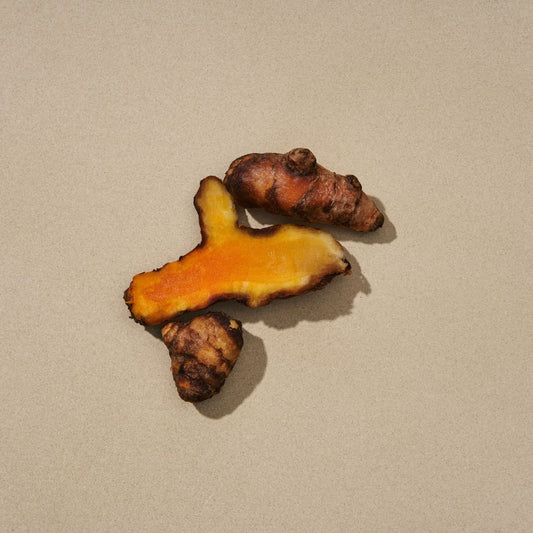The festive period is a time for celebration and, more often than not, that goes hand-in-hand with indulgence. With work parties and Christmas lunches galore, it’s not uncommon for your routine to go out of the window either - with meal times changing and snacking taking place throughout the day. Yep, the struggle is real.
But don’t worry, we’re all in the same boat. So don’t be too hard on yourself. In fact, with these simple Ayurveda tips (which have been around for more than 5,000 years), you can combat that uncomfortable bloated feeling, and give your gut a little helping hand.
1. Drink warm water
If you’re feeling a little sluggish from too much indulgence, it can be tempting to reach for an ice cold drink to awaken your senses. But this can actually do more damage. In fact, Ayurvedic practitioners say you should try to stick clear of cold water as much as possible and instead choose sips of hot water.
It’s believed that warm or hot water helps to soften the intestinal tract and hydrate the cells more than cold water. This is a great way to kickstart your digestive system and get things moving. Studies also show that drinking at least half your body weight in water in ounces is the optimum amount if you want to feel your best, as it’ll leave you feeling awake and revitalised.
Starting your day with warm water and lemon can help to flush your digestive system, and ginger tea has lots of anti-inflammatory properties too.
2. Focus on seasonal foods
Ayurveda says we need to eat fresh and cooked foods that are in season such as root vegetables, so serve yourself an extra portion of veg with your Christmas turkey. It’s believed that our digestion revs up in winter so it’s important to keep it grounded and balanced with hearty dishes and wholesome ingredients. This is why you might be fancying soups, stews and casseroles. While Ayurveda says we should avoid processed foods, that’s easier said than done in December. But don’t worry if you can’t say no to another Quality Street. We’ve all been there. And the Ayurveda way of life is all about balance.
Certain ingredients can help to relieve any bloating or symptoms of Christmas Day over-indulgence though, and can also balance your individual body type or dosha - Kapha, Pitta, Vata. Super-herbs go one step further too by aiding healthy weight loss, keeping your gut regular and acting as a natural antioxidant. This includes Cumin, Amla and Licorice Root.
3. Make lunch your biggest meal
Ayurveda says we should try to eat at the same time every day, and that our biggest meal should be eaten at midday - so just enjoy your festive lunch! This is because your digestive fire is at its strongest during the hours of 10am and 2pm (when the sun is at its peak). If you do find yourself peckish again after your Christmas lunch, a light dinner or snack is ideal.
Where possible, also try to avoid snacking - which we know isn’t always easy when the Christmas boursin keeps getting taken out of the fridge. Put simply, if you want to burn fat and get rid of any bloat, you need to give your body a reason to start burning any excess calories - which happens 4-5 hours after each meal.
4. Consider an Ayurvedic detox
If your digestion is feeling sluggish or you feel bloated between Boxing Day and the new year, (who doesn’t?!) then you can give it the kick it needs with a 4-day detox. Or save it for January after a week of indulgence. It works by giving your body a full reset, eliminating any toxins and giving incomplete digestion a little push in the right direction.
Each day, your meals will centre around Ayurvedic super-herbs as well as Kitchari, which is made up of rice, mung beans and spices. The detox won’t just aid digestion though as it also increases energy and vitality, removes heaviness from the body and boosts overall health. Something everyone could benefit from after the festive season.
5. Incorporate Turmeric into your Ayurvedic diet
We talk about Ayurvedic super-herbs a lot! In short, they’re a variety of herbs and spices that have incredible health benefits and can help to balance the mind, body and gut.
In terms of digestion, Turmeric is the wonder spice though - add it in your cooking or sprinkle it in your smoothies. Or you can get your daily dose with our Gold Shield immunity capsules. As well as its anti-inflammatory properties, it’s a great way to decongest and also supports healthy organ function. Other ingredients to look out for include Fennel Seeds and Apple Cider Vinegar.
6. Find some time to practice yoga
Yoga helps to stretch out the stomach muscles and keep the digestive system moving. Child’s Pose is said to provide immediate and natural relief for stomach cramps and gas, and by lying on the floor and pulling your knees into your chest (or in yoga terms, Apanasana) you can get relief from bloating.
A morning yoga session can help to prepare the stomach and digestive system for the food that’s about to be consumed, and helps to create a routine which is hugely important in Ayurveda. Getting out for a walk or doing some light physical activities can also help to move blood around the body and keep things moving, which can help you to lose weight too.
7. Add a natural supplement for digestion
At Deja, we’ve combined years of research as well as experience into the Ayurveda way of life to bring you a complete range of natural supplements. Our best-selling Rest and Digest capsules have even been created to keep your gut happy, from the inside out.
Containing a soothing blend of Ayurvedic herbs, such as Ginger, Fennel, Long Pepper and Triphala, it works to naturally cleanse and detoxify your body - exactly where you need it the most. Not just that but Fennel and Ginger have specific benefits for reducing bloating as well as painful stomach cramps and other digestive issues. By simply taking two capsules every day, it can improve your digestion and maintain your stomach health, contributing to better overall wellbeing.
Of course, these are just a few Ayurvedic tips for bloating. For more Ayurvedic weight loss tips and lifestyle hacks, visit our blog or head to Instagram to get some inspo.




